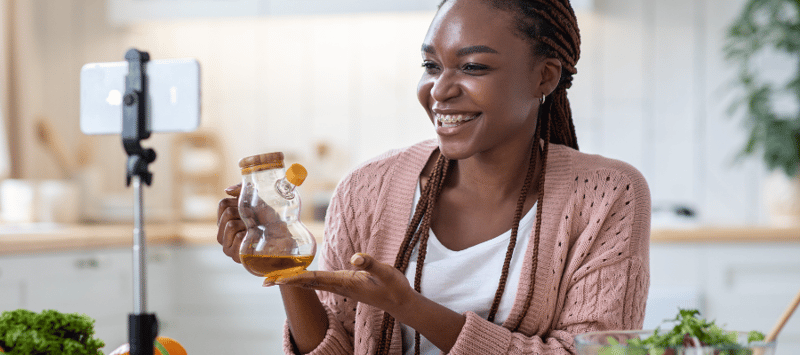
Are you a self-proclaimed DIY-er when it comes to your diet and nutrition? Maybe you're someone who loves to research and create your own personalized meal plans. Or perhaps you've tried every fad diet out there and are ready for a more sustainable approach to your weight loss and health goals.
In recent years, DIY dieting and self-guided materials for nutrition counseling have become increasingly popular options approach.
Whatever your motivation may be, the world of DIY dieting and self-guided materials for nutrition counseling is growing rapidly. But is going it alone really the best option for your health journey?
At OnPoint Nutrition, we've seen the benefits of professional nutrition counseling firsthand.We have helped more than 3,000 individuals create personalized plans for better nutrition and lifestyle to solve all sorts of health concerns and live better.
Over our 8 years of practice, we have encountered thousands of people that have put their all into developing a great plan for their health and wellness, but then realized that the support of a professional made all the difference in their health journey.
Nutrition counseling is a valuable resource for individuals looking to improve their health and wellbeing through better dietary choices. Traditionally, nutrition counseling has been provided through one-on-one sessions with a Registered Dietitian or Nutritionist.
But not everyone has the resources to invest in a one-on-one program, and sometimes you just aren't ready socially and emotionally to connect with someone regarding your health goals.
This article will explore the similarities and differences between DIY dieting and self-guided materials for nutrition counseling. We will also discuss the advantages and disadvantages of each approach to help you make informed decisions about which option is the best for your needs.
Let's take a look!
First a Brief Difference Between DIY and Self Guided
DIY dieting involves creating a personalized diet plan without the guidance of a healthcare professional. This approach can be attractive due to its flexibility and cost-effectiveness, but it also carries potential risks if individuals don't have accurate information or guidance.
Self-guided materials for nutrition counseling, on the other hand, provide educational resources, such as books, online courses, and mobile applications, that individuals can use to educate themselves on proper nutrition and make informed decisions. These materials are often created by Registered Dietitians or Nutritionists and can be accessed at any time for convenience.
So let's dive into the world of DIY dieting and self-guided nutrition counseling materials to see how they stack up against the proven benefits of working with a Registered Dietitian or Nutritionist.
DIY Dieting vs. Self-Guided Materials for Nutrition Counseling: What's the Difference?
Everyday we have thousands of people coming to our company looking for help with their weight loss and health goals, but often they just aren't ready to work on a personal level.
We recognized there is a massive need for self-guided materials curated by professionals to serve this group of people. Rather than scouring the internet for obscure resources and conflicting resources, we believe that quality, up-to-date information is sought after and we wanted to make it available.
While both DIY dieting and self-guided materials for nutrition counseling offer individuals the opportunity to take control of their dietary choices, there are key differences between the two approaches.
DIY dieting refers to the process of designing and implementing a personalized dietary plan without the guidance of a nutrition professional. This approach can be flexible and cost-effective, as individuals have the freedom to make their own decisions about what foods to eat and when.
However, without the expertise of a nutrition professional, individuals may become subject to misinformation and not get the full picture of proper nutrition and as a consequence overlook important nutrients, misinterpret dietary recommendations, or make choices that are not in line with their overall health goals.
On the other hand, self-guided materials for nutrition counseling can provide you with educational resources to help you make informed dietary choices. While these materials can be accessed at any time and are often more affordable than working with a nutrition professional, they lack the personalized guidance and support that a nutrition professional can provide. This can lead to misunderstandings or misinterpretations of the information presented in these materials.
The implications of these differences are significant for individuals seeking nutrition guidance. Those who choose to pursue DIY dieting must be willing to take on the responsibility of designing and implementing their own dietary plan, which may require a significant amount of time and effort.
In contrast, those who choose to use self-guided materials for nutrition counseling must be willing to invest time and effort into educating themselves on proper nutrition with the material provided. Additionally, they must also be aware of the potential risks and drawbacks of relying solely on these materials rather than having a professional to talk to.
You should consider you own needs and goals when deciding which approach to pursue, and may benefit from working with a nutrition professional to ensure you receive personalized guidance and support in achieving your dietary goals.
Let's talk about how that looks for the DIY-ers!
The Pros and Cons of DIY Dieting
DIY dieting has become a popular approach for individuals looking to improve their health through better nutrition. Cue the Google search (bet that's how you got here! 😉)
As we mentioned, DIY dieting involves creating a personalized diet plan based on an individual's specific needs and preferences, without the need for guidance from a nutrition professional.
This allows for:
- flexibility
- lower-cost
- less structure
While this approach offers certain advantages, it also comes with some significant drawbacks to DIY dieting.
Without personalized guidance from a healthcare professional, individuals may be at risk of receiving misinformation or not considering important factors in their dietary choices.
This could lead to negative health consequences, including malnutrition, weight gain, or even serious health conditions.
Additionally, DIY dieting lacks the accountability and support that can come with working with a nutrition professional. It can be challenging to stick to a personalized diet plan without support and guidance from someone with knowledge and experience in the field. This lack of accountability can make it difficult for individuals to achieve their health goals or maintain their progress over time.
Overall, DIY dieting can be an attractive option for individuals looking for flexibility and cost-effectiveness in their dietary choices. However, it's essential to consider the potential risks and drawbacks of this approach and ensure that individuals have access to accurate information and support throughout their dietary journey.
The Pros and Cons of Self-Guided Materials for Nutrition Counseling
Self-guided materials for nutrition counseling, such as books, online courses, and mobile applications, provide individuals with educational resources to help them make informed dietary choices.
DIY and Self-guided materials for nutrition counseling are designed to provide individuals with convenient and accessible resources to educate themselves on proper nutrition. Much like DIY, self-guided materials share similar benefits regarding the flexibility and structure.
They can be accessed at any time and often come at a lower cost than working directly with a Registered Dietitian or Nutritionist. Additionally, these materials can be helpful for individuals who live in areas with limited access to healthcare professionals or have scheduling constraints that make it difficult to attend in-person sessions, but would like the security of a professional being involved in their plan.
Self-guided materials also have some disadvantages. Without personalized guidance from a nutrition professional, individuals may misinterpret or misunderstand the information presented in these materials. This can also lead to negative health consequences, though with a professional curating these materials, if you choose carefully the plan you are following, your risk is greatly reduced in comparison to just grabbing an insta-diet in a random corner of the web.
Nonetheless, self-guided materials still lack the accountability and support that can come with working with a nutrition professional. Self-guided materials however are more structured than a DIY method that you found on your own.
While these resources can be helpful for education and motivation, they cannot provide the same level of guidance and support as working with a Registered Dietitian or Nutritionist.
In summary, self-guided materials for nutrition counseling can be a useful resource for individuals looking to educate themselves on proper nutrition. They offer convenience and accessibility, making them a popular option for many people.
Choosing Between DIY Dieting and Self-Guided Materials for Nutrition Counseling
Both DIY dieting and self-guided materials for nutrition counseling have their own unique advantages and disadvantages. It is important for individuals to weigh these factors carefully when deciding which approach to pursue.
DIY dieting offers individuals a high degree of flexibility and control over their dietary choices, as well as potential cost savings compared to purchasing self-guided materials or working with a nutrition professional. However, this approach also carries the risk of misinformation and may require a significant amount of time and effort to design and implement a personalized dietary plan.
In contrast, self-guided materials for nutrition counseling offer convenience and accessibility to professionally curated information, making them an attractive option for individuals with limited time or resources. However, these materials are generally standard to condition and goal, and may lack the personalized guidance and support that would come with one-on-one conversations about lifestyle. This can lead to misinterpretations or misunderstandings of dietary recommendations.
When choosing between these approaches, individuals should consider their own goals and needs. Those who are confident in their ability to design and implement a personalized dietary plan may prefer the flexibility and control of DIY dieting. However, those who are new to nutrition, long term health goals, or have specific dietary needs may benefit from the guidance and support of self-guided materials (or even directly working with a nutrition professional).
Ultimately, the decision to choose DIY dieting or self-guided materials for nutrition counseling should be based on an individual's unique circumstances and goals. By weighing the pros and cons of each approach, individuals can make an informed decision and take the first step toward achieving their dietary goals.
Making an Informed Decision: The Value of DIY Dieting and Self-Guided Materials for Nutrition Counseling
In this article, we have explored the differences between DIY dieting and self-guided materials for nutrition counseling. Both approaches offer you the opportunity to take control of your dietary choices, but each has its own success rate and best use case.
After 8 years of experience, OnPoint Nutrition unequivocally asserts that professional nutrition counseling is essential for achieving optimal health and wellness.
Our team has personally witnessed the transformative effects of personalized nutrition plans for over 3,000 individuals, who have successfully addressed various health concerns and improved their quality of life.
We firmly believe that with the guidance and expertise of a nutrition professional -- even if it's on paper instead of in person -- you can avoid the struggle to achieve your health goals.
When choosing between these approaches, you should consider your own commitment level, nutrition knowledge, accountability, goals, and general needs.
By considering the advantages and disadvantages of each approach as they relate to these factors, you can make an informed decision about which approach is right for you.
Ultimately, the key to success in achieving dietary goals is to take a personalized, informed, and sustainable approach to nutrition. So don't take your decision lightly - let's chase your health goals!

With a knack for turning complex nutrition facts into engaging, relatable content, she’s on a mission to make healthy living fun and accessible. Backed by a stellar team of Dietitians and Nutritionists, Abby breathes life into OnPoint’s mission, inspiring others to embrace the transformative power of good nutrition. Her infectious enthusiasm and innovative approach make her a driving force in the journey towards better health for all.



